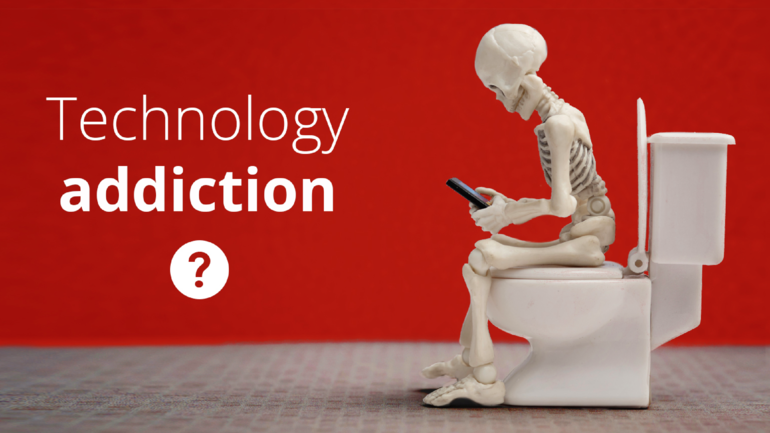The advent of the Internet, as well as the widespread usage of smartphones, tablets and personal computers, has made it harder to have a healthy relationship with technology. Could you turn off your phone and not use the Internet for 24 hours if you wanted to? How about 48 hours or even a week? The answer to this question is frequently a resounding “no”, and we all understand why this is the case. Technology is becoming more pervasive and indispensable in both our professional and personal lives.
Staying connected on social media, taking part in video conferences at work, and replying to emails may all contribute to a “always on” mindset. We may feel as though we are losing out on important information if we are not constantly connected to technology. However, research suggests that excessive use of the Internet and internet-enabled gadgets can lead to a technological addiction, which is often disregarded owing to society’s general acceptance of the overwhelming use of digital technologies.
Is addiction to technology real?
Addiction, which comes from the Latin word meaning “enslavement,” is a compulsive dependency that causes suffering to the affected person. This is a behavior that is extremely difficult to halt, even when the person wants to. Technology addiction is a behavioral habit defined by a reliance on the Internet and technologically equipped gadgets. While we use technology to thrive in today’s social environment, an overreliance on technology may be socially damaging.
It appears that technology addiction is a real ailment that affects people all over the world. However, there are two sides to every story. Technology addiction is a broad term that isn’t often precisely defined, and it’s uncertain if these potentially unhealthy technological habits are addictive. Also, people are quick to characterize activities they don’t like or understand as “addictive” in order to justify their own and others’ actions.
Some mental health practitioners believe that digital addiction is a sign of another condition, such as anxiety or depression, rather than a distinct disorder in and of itself. Furthermore, the World Health Organization (WHO) and the Diagnostic and Statistical Manual of Mental Disorders have not as yet specifically identified smartphone or other consumer technology addictions. However, we can’t dismiss the fact that some people that use digital media do exhibit symptoms of overdependence on this technology.
Is technology over dependance dangerous?
As there is no scientific proof that technology is addictive, and as the word “addiction” has a very negative connotation, let’s not label this potential issue as such. However, overdependence on tech may be exceedingly harmful, causing the user to develop a variety of neurological, psychological and social problems. Furthermore, such activities can have a negative impact on an individual’s job if they spend more time on digital devices than on work-related tasks, resulting in procrastination and avoidance of work.
Technology overuse can have a negative influence on one’s mental health, aggravating or leading to anxiety, depression, ADHD, and other problems such as restlessness, impatience, anxiety, and sometimes even rage. Some claim that this issue can even affect the brain’s ability to create dopamine, but that is yet another hypothesis that has to be scientifically verified.
Headaches, weight gain or loss, backaches, and carpal tunnel syndrome are just a few of the physical health issues that can result from excessive use of technology. It can also have a negative impact on physical health due to a poor diet, lack of physical activity, inadequate self-care, insomnia or detrimental sleeping habits, which can exacerbate underlying mental health disorders and lead to elevated stress levels.
What are the hazardous signs to look out for?
Despite the lack of consensus on diagnostic criteria of excessive dependence on technology, a number of studies have been published that provide useful information on problematic indicators and symptoms. Excessive use of digital gadgets can be a sign of dependency on technology, although this is not always the case. Certain technologies exploit the underlying human urge to experience a feeling of belonging and connection with others and, as a result, many aspects of product design are focussed on accentuating the user’s fear of missing out.
Some signs of a technology addiction include:
- The inability to control or refrain from using technology or a particular digital media.
- Obsessive technological use or desires and impulses to utilize digital gadgets.
- Neglecting crucial aspects of one’s life, such as job or relationships, in favor of technology.
- Loss of interest in social activities and hobbies.
- Using gadgets in potentially hazardous situations, such as when driving.
- Having undesirable mental health symptoms like depression, anxiety, stress or irritability.
- Lying or concealing one’s technology usage from family, friends or colleagues.
- Using digital gadgets for extended periods of time or finding oneself using digital devices more frequently over time.
Conclusion
While the influence of technology on our lives is generally beneficial, many individuals are falling prey to a self-defeating illusion that makes it more difficult to cut down on their device usage. It’s practically impossible to avoid using technology today, but when feasible, it is beneficial to take a digital detox. As a concluding thought: Did you know that taking a week’s break from social media has been linked to increased overall happiness?







